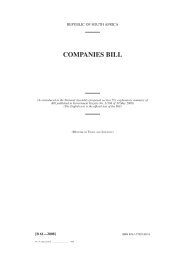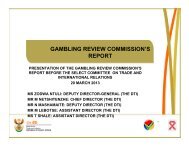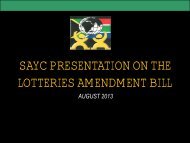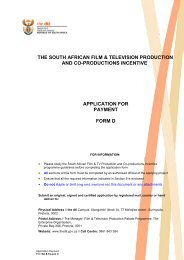Copyright Review Commission Report - ICT Law and Regulation ...
Copyright Review Commission Report - ICT Law and Regulation ...
Copyright Review Commission Report - ICT Law and Regulation ...
- No tags were found...
Create successful ePaper yourself
Turn your PDF publications into a flip-book with our unique Google optimized e-Paper software.
5.3 ‘GOOD PRINCIPLES’ OF COLLECTING SOCIETIES5.3.1. Given the complexity of collective management, as a rule, only one organisation for any one category of rightsowners should be open for membership on reasonable terms to all rights owners of that category. A longestablishedexception to this principle is the alliance between Adami <strong>and</strong> Spedidam (societies representingperformers in France), which, by virtue of their existence, represent featured <strong>and</strong> non-featured artists. By meansof reciprocal representation agreements with foreign societies or federations of societies, a collecting societyshould represent in its territory both national <strong>and</strong> foreign rights owners. Competing societies in respect of thesame right lead to duplication of functions <strong>and</strong> reduction in economies of scale <strong>and</strong> thus are unlikely to bringbenefits to their members.5.3.2. Collecting societies must have valid m<strong>and</strong>ates to act as agents or licensees of their members, or takeassignment of their individual rights <strong>and</strong> have the legal personality required to: Enter into binding contracts, at both national <strong>and</strong> international level; Exercise the m<strong>and</strong>ate or assignment received from their members; <strong>and</strong> Enforce their members’ rights by means of legal action, where necessary.5.3.3. Societies should provide an efficient, transparent <strong>and</strong> equitable service to their members. Members shouldreceive regular, detailed information about the manner in which their rights are being exercised.5.3.4. In many countries, the establishment <strong>and</strong> operation of collecting societies is subject to some form ofsupervision, which may be exercised in various ways. Some countries make the establishment of a collectingsociety conditional upon the approval of a competent authority, Minister of Culture, the Ministry of Justice or thePatent Office. In France <strong>and</strong> Spain, for example, authorisation to operate as a collecting society must beobtained from the respective Ministry of Culture. Due account is taken of the degree to which the proposedsociety is representative of the category of rights holders it purports to represent, the volume of potential users,the suitability of its statutes, <strong>and</strong> the means whereby it proposes to achieve its aims. In France, however, if forany reason the Ministry should refuse to authorise a society to operate, the courts have jurisdiction to decide thematter after assessing the professional qualification of the founders of such society, <strong>and</strong> the human <strong>and</strong>material means they intend to use to collect royalties <strong>and</strong> exploit their repertoire. In Senegal, the collectingsociety is established by law <strong>and</strong> is a public institution with professional character established under the nameof the <strong>Copyright</strong> Office of Senegal (Bureau Senegalais Du Droit D ‘Auteur, BSDA), under the authority of theMinister of Cultural Affairs. In Germany, the Patent Office is the supervising authority for collecting societies.5.3.5. The methods <strong>and</strong> rules of collecting societies regarding the distribution of royalties, on the basis of a statisticallyvalid sampling procedure, should be approved by the rights owners. There should be no discrimination betweenrights owners, members or non-members, national or foreign. Government supervision of <strong>and</strong> interference inthe establishment <strong>and</strong> operation of tariffs <strong>and</strong> other licensing conditions applied by collecting societyorganisations, which are in a de facto monopoly position vis-à-vis users, are justifiable to the extent that suchsupervision is required to prevent abuse of such position.5.3.6. Various jurisdictions have dealt differently with the reality that collecting societies, having a de facto monopolyposition, may abuse that position. The UK, Australia <strong>and</strong> South Africa have some form of compulsory specialtribunal having jurisdiction to review the activities of collecting societies or vary the rates charged, <strong>and</strong> to order- 41 -
















